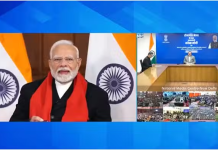New Delhi: The Supreme Court on Monday declined to entertain PIL seeking direction for Election Commission (EC) that political parties should not field candidates charged with serious offences.
Last year in September, the top court had said it cannot usurp the power of law-making which is vested with the legislature. “Though criminalisation of politics is a “bitter manifest truth”, which is a “termite” to the citadel of democracy, the court cannot make a law to check it,” a five-judge constitution bench headed by the then Chief Justice Dipak Misra had said.
The bench had left it to Parliament to bring in a strong law by which it should be mandatory for political parties to revoke the membership of those against whom charges have been framed in heinous offences.
Supreme Court declines to entertain PIL seeking direction for Election Commission that political parties should not field candidates charged with serious offences. pic.twitter.com/YsmITRu4j4
— ANI (@ANI) January 21, 2019
The bench was hearing a batch of pleas raising a question whether lawmakers facing criminal trial can be disqualified from contesting elections at the stage of framing of charges against them.
Meanwhile, last year in February, the election commission of India (ECI) had filed an affidavit in SC asking to amend the law and bar people with serious charges from contesting elections.
According to the affidavit, ECI should be given the power to de-register political parties and be authorised to issue necessary orders regulating and deregistration of parties.
The panel has always raised voice against the convicted person filing for election and demanded that they should be stopped from forming political parties. The EC’s response was filed by Vijay Kumar Pandey, director (law), to a PIL filed by advocate Ashwini Kumar Upadhyay asking why a convicted person, otherwise debarred from contesting polls, was allowed to form a political party.
Currently, the poll watchdog responsibility to organise the election in a peaceful manner. Moreover, the Representation of the People Act, 1951, also has no explicit provision for de-registration of a political party.
The Commission, stating that it first wrote to the Union Law Ministry in 1998, urged the necessity of giving it the power in view of the fact that many political parties get registered, but never contest an election.
According to the prevalent law, the lawmakers and candidates are barred under the Representation of Peoples Act from contesting elections only after their conviction in a criminal case.
(With PTI inputs)














































